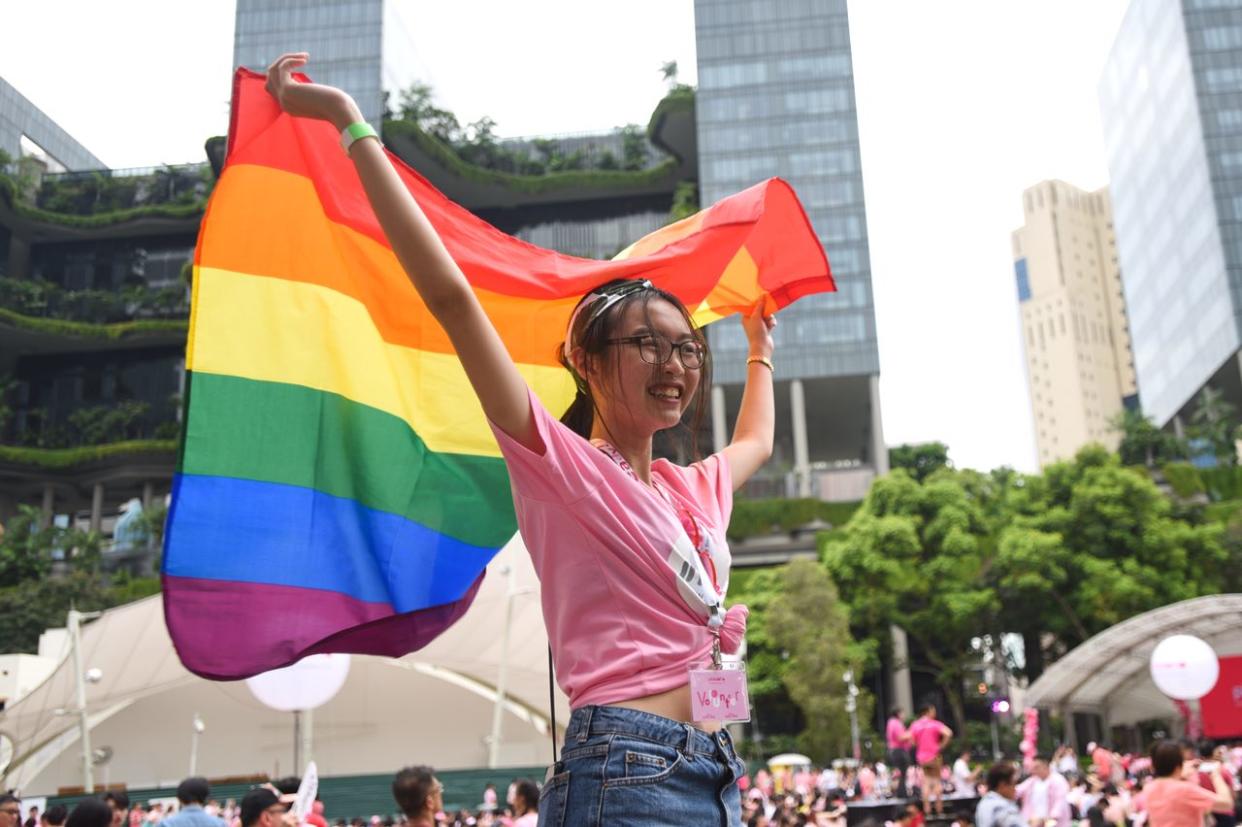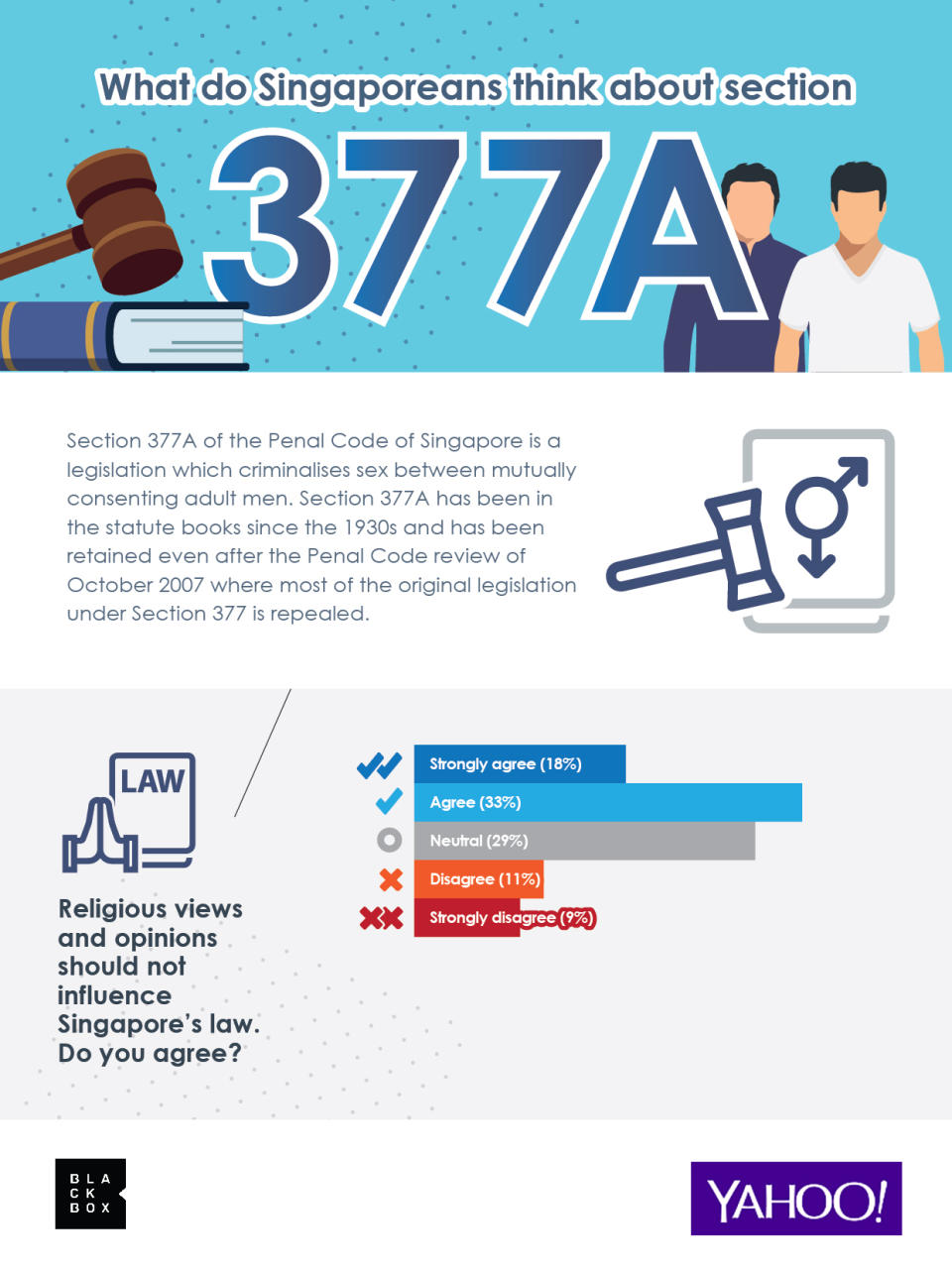Most Singapore residents agree religious views shouldn't influence the law: survey

This is the third of four stories based on the responses by Singapore residents to questions in a Blackbox Research survey related to Section 377A of the Penal Code.
More than half of Singapore residents strongly agreed or agreed that religious views and opinions should not influence Singapore’s laws, according to a survey commissioned by Yahoo News Singapore.
Of the other respondents, about 20 per cent strongly disagreed or disagreed with the statement, while 29 per cent were neutral.
The survey, conducted by Blackbox Research between 12 and 19 October, asked 1,000 Singaporeans and permanent residents on their views on Section 377A of the Penal Code as well as sex between women.

Under Section 377A, sex between men is illegal in Singapore although it is rarely enforced.
By age groups, the biggest proportion of respondents who strongly agreed or agreed with the statement was 54 per cent among those who were 50 years old and above, followed by 52 per cent (15-24 years old), 49 per cent (25-34 years old) and 47 per cent (35-49 years old)
Among those who strongly disagreed or disagreed with the statement, the proportions were 25 per cent (15-24 years old), 20 per cent (25-34 years old), 17 per cent (35-49 years old) and 21 per cent (50 years old and above).
The proportions who were neutral were 23 per cent (15-24 years old), 31 per cent (25-34 years old), 36 per cent (35-49 years old) and 25 per cent (50 years old and above).
By gender, more males strongly agreed or agreed with the statement at 52 per cent, compared with 49 per cent of females.
The proportions of males and females who were neutral on the statement were 28 and 31 per cent, respectively.
The proportions of males and females who strong disagreed or disagreed with the statement were the same at 20 per cent.
The debate over Section 377A, introduced in Singapore in 1938, was reignited after the Supreme Court of India ruled on 6 September that consensual gay sex was not a crime in the country following a two-decade legal battle.
Section 377A was enacted when India and Singapore were still under British colonial rule.
The landmark ruling stirred heated discussions between LGBT activists in Singapore, who argue for a repeal of the law, and those who are against such a move.
Veteran Singapore diplomat Tommy Koh, who is Ambassador-at-Large, waded into the debate when he encouraged Singapore’s LGBT community to bring a class action to challenge the constitutionality of Section 377A in a Facebook post.
Petitions have since been started by activists on both sides of the divide, with religious groups weighing in, and a deejay filing a fresh legal challenge.
Singapore human rights group MARUAH said repealing the law would help “ensure a secular common space”.
In a statement, Braema Mathi, the group’s president, said that “many calls” for the retention of the law “are motivated by genuine religious belief”.
She added that while members of religious groups have a right to their own views on gender identity and sexual orientation issues, it “should not be exercised in a way that infringes on the human rights of others, and denies the rightful equal status before the law that every person ought to enjoy”.
Humanist Society (Singapore) echoed the view in a blog post, in which the group announced its support for a repeal of Section 377A.
“Freedom if religion, and freedom from religion, dictate that no one needs to live by a dogmatic set of rules specific to religions or traditions that belong to another person’s belief system,” said the group, described as a registered society for “humanists, freethinkers, atheists, agnostics and other like-minded people”.
The views among the leaders of the different faiths were somewhat divided on the issue, with most taking a firm stance in urging Singapore to keep the law.
The president of Buddhist Fellowship (Singapore) Lim Phang Hong, had signed the petition to repeal Section 377A and written on Facebook in support of such a move.
On the other hand, religious bodies such as the National Council of Churches, Singapore Islamic Scholars and Religious Teachers Association (Pergas) and the Roman Catholic Archdiocese of Singapore have strongly urged the authorities to retain the law in order to safeguard the traditional family unit.
According to the General Household Survey 2015, over 43 per cent of the population are Buddhists or Taoists, while over 18 per cent are Christians, with 18 per cent Muslims and 14 per cent Hindus. Only 0.6 per cent profess to not have any religion.
Read more about the Blackbox survey:
Singapore residents split on whether 377A repeal would lead to breakdown of family unit: survey
Related stories:
Repeal 377A organisers urge supporters to reach out to their MPs
K Shanmugam answers queries on Section 377A by church leaders at briefing

